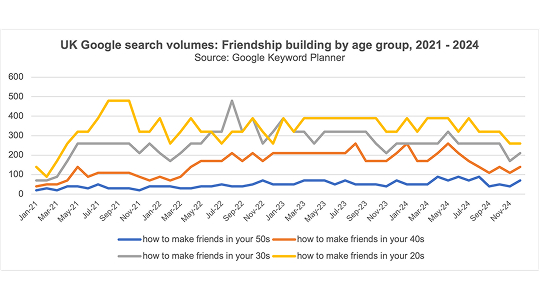How to make friends and rebuild lost connections

Your health expert: Dr Pablo Vandenabeele, Clinical Director for Mental Health at Bupa UK
Publish date 14/04/2025
Next review 14/04/2026
Pablo Vandenabeele shares advice to reduce adult loneliness, as Bupa research uncovers growing numbers in the UK are trying to make more friends.
Loneliness statistics
Between January 2021 and December 2024, UK Google searches significantly changed:
Meet friends near me
17 times as many searches.
International pen pals for adults
Nine times as many searches.
Free chat online friends
Six times as many searches.
How to meet friends as an adult
Five times as many searches.
Benefits of friendship
Did you know that friendships can have a direct effect on your health and wellbeing? Humans thrive on quality connections and need them to stay mentally and physically well.Good friendships can help you live a longer, happier life. They encourage you to avoid unhealthy habits, and reduce blood pressure by understanding and guiding you through life’s problems.
If you’re going through a tough time, a friend can be the difference between struggling and feeling lost, to coping and feeling secure. When you can share your problems with someone you trust, it can help improve your self-worth and see things from another perspective. This may reduce the likelihood of experiencing a low mood, as well as mental health conditions such as anxiety and depression.
Friendships also help us combat loneliness and its negative health effects. Research has shown that loneliness can be linked to several mental health conditions, including depression, anxiety, stress, low self-esteem and sleep problems. Long-term loneliness can impact your physical health too, making you more susceptible to developing some illnesses and infections.
Changing friendships across age groups
Our research indicates many people in the UK aren’t happy with their current friendships. Friends are supposed to make us feel championed, loved and supported. If yours don’t make you feel that way, you may find it impacts your health and wellbeing.
Over the last four years, we’ve investigated friendship building search habits across different age groups. We found that the older you get, the less likely you are to turn to Google for advice on friendship building.
This might suggest that older adults are happier with their friendship groups, compared to younger people - or they’re less likely to work on their relationships if a friendship fizzles out.
New friendship findings:
- Google users searching for ‘how to make friends in your 30s’ have tripled.
- Google users searching for ‘how to make friends in your 20s’ have doubled.
- Though volumes are relatively lower, Google searches for ‘how to make friends in your 40s’ and ‘how to make friends in your 50s’ have quadrupled.

Dr Pablo Vandenabeele says:
“Developing and maintaining quality relationships isn’t always easy, but the benefits and support you gain from them can be hugely rewarding, whatever your age. If you feel like you’ve exhausted your current friendship options, it may be appealing to try and find connections from further afield, like via an app or even through a pen pal scheme – both of which we’ve seen become more popular in our research.
“Our research highlights the resurgence of pen pals – both locally and internationally. In a world where connections are only a click away, pen pal popularity may suggest that some are looking to sidestep social media to instead develop connections in a more nostalgic way, and learn about new social and cultural spheres.
“When making new friends, use common sense and prioritise your safety, especially when reaching out to people from further afield. It’s important to remember that the number of friends you have isn’t necessarily a marker of their quality. It’s better to have fewer connections if they’re more supportive.”
Why do I keep losing friends?
It can be natural for some friendships to change over time. Drifting interests or life’s circumstances may make it difficult to maintain your relationship.
Losing contact with someone you’ve previously been close to can be difficult.
It may even knock your confidence when it comes to making new friends, meaning that you hold yourself back from developing meaningful connections.
Sometimes, drifting apart from friends isn’t necessarily a bad thing – especially if you feel they’re unsupportive.
It may give you the opportunity to step back and think about how your previous friendships have served you, and what an ideal friendship looks like for you.
If there’s a clear reason that you’ve lost touch with a friend, think about the potential reasons for this. In your future relationships, strive to find different qualities.
How to make friends as an adult
Whether you want to refresh your friendship group or add to it, reflecting on previous relationships may help you develop new, lasting ones.
Make local friends
If a friend has moved away and you miss having them nearby, prioritise making connections in your community. You could look at volunteering options or join a club to meet people who share your interests and values.
Connecting with your neighbours can be a great way for friendship to blossom. It can start as something as simple as striking up conversation when you see them, or offering well wishes for cultural celebrations.
Make regular visits to areas where others are likely to gather, like cafes and exercise areas like gyms or parks to give yourself natural chances to meet new people.
Reconnect with old friends
Building friendships may feel easier if you’re already known to the person. You might have lost touch and want to reconnect, or met someone a few times who you’d like to get to know better.
Look for natural opportunities to reach out to them – it may be that you read an interesting article that you think they’d like, or even an internet meme that you know they’ll laugh at.
Sometimes it can be as simple as letting you know they were thinking of them, and asking what’s new in their world. This may lead to a natural opportunity to ask if they’d like to meet up for lunch or coffee.
Reaching out like this may feel intimidating – especially if you’re worried that the person could ignore you, or say no.
However, it’s always worth a try – and it can help make it less intimidating the next time you try. If you have a mutual friend with the person, it may be useful to ask them if they can help to put you in touch with them.
Say yes
If you’re invited to a social event, consider saying yes even if it feels scary.
While it’s good to have an idea of what you want from your friendships, remember that lasting relationships all start from an initial meeting.
You might not sense a deep connection the first time you meet someone. Strong connections can take time and they always need care and consistency.
Why can’t I make friends?
Many factors can impact how well you’re able to maintain connections with others. Finding the give and take of friendships can be a delicate balance, and sometimes treating others in the way that you’d like to be treated isn’t how they’d like to be treated.
As our research shows, it’s never too late to make friends, or reconnect with old ones. Each friendship needs its own personalised nurturing, but they all thrive on similar foundations:
Listening skills
Ask questions to get a good idea of what’s going on in your friend’s life. This means regularly checking in, so they can share both the good and bad with you.
Keep anything that they share to yourself to show that you can be trusted.
Only offer advice when asked
If a friend is going through a tough time and you want to show them you care, it’s best to listen without judgment.
It might be tempting to share how you’ve coped with similar circumstances in the past, but it’s important to remember that your friend may not want to hear that at this time.
Share things
Listening to a friend’s good and bad news means that you can and should share yours, too.
This helps to build trust and closeness between you. You might find it easier to open up to one friend, rather than a group.
Champion them
Showing a friend kindness helps them to associate you with positive feelings.
From paying a compliment to asking about that work presentation they were telling you about, spurring them on to be the best version of themselves can help to strengthen a relationship.
Consistency
Relationships take time to build.
Like a good habit, checking in with friends might feel a little odd at first. The more you do it, the more natural and regular it will become.
What to do if you have no friends
It can feel disheartening if your attempts to form friendships fall short. You might worry that you said too much, too little or the wrong thing. Feeling rejected may influence your self-confidence and make you reluctant to try making new friends. It may even make you feel like you’re unworthy of making any meaningful relationships.
Social media may compound these feelings. It may feel like your follower list is constantly having fun with their friends, but it’s worth remembering that many people only post about their life when they deem it looks the best version of it. Social media posts documenting what people do alone, or when they’re feeling lonely, are usually less frequent.
One of the most important things to remember is to remain kind to others and yourself – this is the basis of getting the best out of all relationships. If you’re struggling to relate to others, or your mental health is suffering, it could be a sign that you need some help.

Charity services
If you don’t feel comfortable speaking to someone you know, remember that there are plenty of other outlets to share how you’re feeling. Charities like Samaritans and Mind can help.
Mental health support
Speaking to a health professional, like a counsellor or cognitive behavioural therapist, can help review how you see yourself, others and the world to help coach your mindset if you struggle to make friends. You can also get free mental health advice and tools too.


